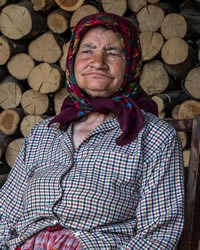Romani call themselves Roma, which in their language means "men." Rom is derived from the Indian word Dom, meaning "a man of low caste who gains his livelihood by singing and dancing." The Romani language, therefore, comes from the name the Romani call themselves. Today they are divided by language. There are a significant number who speak the Baltic dialect of Romani. They live in the three small Baltic countries, Ukraine, Belarus and Poland. Population counts of Baltic Romani are often inaccurate due to their nomadic lifestyle. Others do not possess identity cards because they fear discrimination or persecution.
Romani peoples have their roots in India from centuries ago. They began spreading westward in the tenth century.
Regardless of where they lived, though, to non-Romani, they remained mysterious and distinct. Partly because they come across as strange and partly because of their reputation for dishonesty, they have been persecuted. Hitler tried to exterminate them.
Unlike the Romani who have remained in India, most Baltic Romani have become settled. They often live in villages or near towns and cities. Some still travel by caravans of cars, trucks and trailers.
In the past, the Romani were not allowed to own land, so they began developing unique occupations. These included fortune-telling, horse trading, market vending, entertaining, acrobatics, and metal and woodworking. They are especially known for their musical abilities and dancing. Many sing and play instruments at weddings, baptisms and festivals. Unfortunately, they are also known as beggars and thieves. Petty theft (usually by children), begging, and black market peddling sometimes provide families with income. This reputation has caused much discrimination against them.
In many countries, they are last in line for jobs. Some women work as domestic helpers but are paid low wages and given no health benefits. Many have insufficient housing and unsatisfactory medical attention.
They work with skill but come across as eccentric. All of these things make Baltic Romani interesting and mystical. They come across as different than the local populations which can result in mistrust and even hatred. Gypsies were among those Hitler exterminated.
Baltic Romani marriages are sometimes arranged by parents, and young couples usually marry while in their mid to late teens. Often, they prefer to elope rather than to have a wedding ceremony. Purity before marriage is greatly valued by them, especially for women.
Wherever they live, the Romani people adopt the local religion. In Ukraine, this means adopting some form of Christianity. Beneath the surface of organized religion, they sometimes maintain religious traditions and beliefs. Some believe that ghosts, lizards and snakes are capable of harming humans. People have the power to curse others by giving them the "evil eye." Others have come to true repentance in Christ, and they are following him.
The Baltic Romani people need to put Jesus Christ first in their lives and not let the past hold them back.
Pray that these people who have been rejected and discriminated against will find love and acceptance through Christ.
Pray for the Baltic Romani in Ukraine to have such a strong desire for spiritual truth that they will stop at nothing to find the Lord of lords.
Pray for Romani Christ-followers to take the Lord to others.
Scripture Prayers for the Romani, Baltic in Ukraine.
https://en.wikipedia.org/wiki/Baltic_Romani
https://dbpedia.org/page/Baltic_Romani
| Profile Source: Joshua Project |











